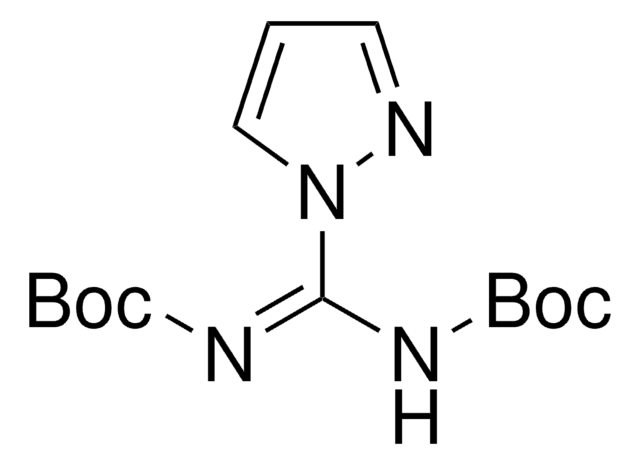402516
1H-Pyrazole-1-carboxamidine hydrochloride
99%
Sinónimos:
1-Amidinopyrazole hydrochloride, Praxadine
About This Item
Productos recomendados
assay
99%
form
powder
mp
167-170 °C (lit.)
SMILES string
Cl[H].NC(=N)n1cccn1
InChI
1S/C4H6N4.ClH/c5-4(6)8-3-1-2-7-8;/h1-3H,(H3,5,6);1H
InChI key
RBZRMBCLZMEYEH-UHFFFAOYSA-N
¿Está buscando productos similares? Visita Guía de comparación de productos
General description
Application
- Preparation of guanidylated hollow fiber membranes.
- Guanylation of amines and in peptide synthesis.
- Synthesis of bis-guanidinium-cholesterol derivatives.
signalword
Danger
hcodes
Hazard Classifications
Acute Tox. 4 Oral - Aquatic Chronic 3 - Eye Dam. 1 - Skin Sens. 1 - STOT RE 2
Storage Class
11 - Combustible Solids
wgk_germany
WGK 2
flash_point_f
Not applicable
flash_point_c
Not applicable
ppe
dust mask type N95 (US), Eyeshields, Gloves
Certificados de análisis (COA)
Busque Certificados de análisis (COA) introduciendo el número de lote del producto. Los números de lote se encuentran en la etiqueta del producto después de las palabras «Lot» o «Batch»
¿Ya tiene este producto?
Encuentre la documentación para los productos que ha comprado recientemente en la Biblioteca de documentos.
Los clientes también vieron
Nuestro equipo de científicos tiene experiencia en todas las áreas de investigación: Ciencias de la vida, Ciencia de los materiales, Síntesis química, Cromatografía, Analítica y muchas otras.
Póngase en contacto con el Servicio técnico













